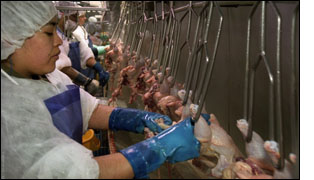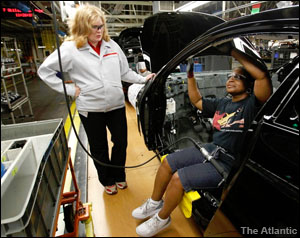NEWS ROUNDUP
Ex-Im tap dance, 22 days and no TPP, school to prison…
Tuesday, October 27, 2015
AEROSPACE
► In the P.S. Business Journal — Machinists picket Boeing aerospace supplier amidst contract dispute — Machinists union members walked picket lines outside a major Boeing building in Everett Monday, although this time their target was not Boeing. Instead, Machinists District Lodge 751 were engaged in a one-day “informational picket,” designed to push management of Cadence Aerospace-Giddens toward a resolution after four months of contract talks.
 ► From The Hill — Ex-Im Bank supporters force House vote — House Republican centrists teamed up with Democrats Monday night to force a vote on reviving the Export-Import Bank, outraging conservative opponents of the agency. Sixty-two Republicans voted with all Democrats in a 246-177 vote to begin the process of what’s known as a discharge petition. The vote Monday evening discharges a rule establishing floor debate from the Rules Committee — the first hurdle in a three-step process. The House is expected to vote Tuesday on the rule itself and on passage of the underlying bill.
► From The Hill — Ex-Im Bank supporters force House vote — House Republican centrists teamed up with Democrats Monday night to force a vote on reviving the Export-Import Bank, outraging conservative opponents of the agency. Sixty-two Republicans voted with all Democrats in a 246-177 vote to begin the process of what’s known as a discharge petition. The vote Monday evening discharges a rule establishing floor debate from the Rules Committee — the first hurdle in a three-step process. The House is expected to vote Tuesday on the rule itself and on passage of the underlying bill.
 EDITOR’S NOTE — Rep. Cathy McMorris Rodgers was the only member of Washington state’s Congressional delegation who voted “no” on Monday. In doing so, she sided with the extreme conservative Freedom Caucus faction of the Republican Party over the clear best interests of businesses and working families in her home state. She told her local paper that she intends to vote “yes” on the bill itself Tuesday, but opposed the procedure that allowed it to come to a vote. Translation: This way I can claim I supported both the Koch brothers AND Boeing. Win win! Watch and learn, Jaime.
EDITOR’S NOTE — Rep. Cathy McMorris Rodgers was the only member of Washington state’s Congressional delegation who voted “no” on Monday. In doing so, she sided with the extreme conservative Freedom Caucus faction of the Republican Party over the clear best interests of businesses and working families in her home state. She told her local paper that she intends to vote “yes” on the bill itself Tuesday, but opposed the procedure that allowed it to come to a vote. Translation: This way I can claim I supported both the Koch brothers AND Boeing. Win win! Watch and learn, Jaime.
STATE GOVERNMENT
► In today’s News Tribune — 10 lawmakers join call for high court to reconsider decision on charter schools — The 10 lawmakers, which include five Democrats and five Republicans, filed an amicus brief with the high court Monday asking the court justices to reconsider their decision that declared the privately operated, publicly funded schools unconstitutional.
EDITOR’S NOTE — Democratic Reps. Judy Clibborn, Eric Pettigrew and Larry Springer, and Sens. Steve Hobbs and Mark Mullet, plus Republican Reps. Chad Magendanz and Norma Smith, and Sens. Joe Fain, John Braun and Steve Litzow.
ALSO at The Stand — Charter schools ruling is a rebuke of privatization agenda
TRANSPORTATION
 ► In today’s Seattle Times — State: More drivers, more gridlock, more delays — Washington state’s robust economy has brought a small increase in driving, but it’s enough to cause a staggering amount of delay on urban highways. Congestion last year in the Seattle metropolitan area — from Everett to Olympia — was 19 percent worse than in 2007, before the recession hit, according to a state transportation department (WSDOT) report released Monday. Some roads are so saturated that, in many places, drivers attempt to outwit the gridlock by traveling earlier in the morning, or running errands in early afternoon. The result is that stop-and-go traffic lasts more hours a day.
► In today’s Seattle Times — State: More drivers, more gridlock, more delays — Washington state’s robust economy has brought a small increase in driving, but it’s enough to cause a staggering amount of delay on urban highways. Congestion last year in the Seattle metropolitan area — from Everett to Olympia — was 19 percent worse than in 2007, before the recession hit, according to a state transportation department (WSDOT) report released Monday. Some roads are so saturated that, in many places, drivers attempt to outwit the gridlock by traveling earlier in the morning, or running errands in early afternoon. The result is that stop-and-go traffic lasts more hours a day.
► In today’s (Everett) Herald — Feds kick in $10M for new Mukilteo ferry terminal — The state learned Monday it will be getting a $10 million federal grant that should be the final piece of funding required for the new Mukilteo ferry terminal. “These funds cement our ability to get a good project for the community,” said state Sen. Marko Liias (D-Lynnwood).
► In today’s News Tribune — Tacoma Link expansion gets $15 million in federal money
INTERNATIONAL TRADE
► From AFP — Obama wins Indonesian backing for TPP — President Obama won Indonesia’s endorsement for a contentious trans-Pacific trade deal Monday, with the president of Southeast Asia’s largest economy vowing to join. Twelve countries are currently party to the Trans-Pacific Partnership — including Australia, Canada, Japan, Mexico, Vietnam and the United States — creating the world’s largest free trade area.
 EDITOR’S NOTE — It’s been 22 days since the U.S. reached a deal on the TPP, but the White House continues to block its release. Previously, the Obama administration claimed secrecy was necessary so we don’t reveal our hand in negotiations at the bargaining table. So why is it still necessary to keep this deal a secret when it’s touted as such a great deal for American working families? As AFL-CIO President Richard Trumka said, “In my experience, when there is such good news to share, there is no need for secrecy. If TPP will do for the American middle class all that U.S. Trade Representative claims, releasing the text would be the single best way to prove that.”
EDITOR’S NOTE — It’s been 22 days since the U.S. reached a deal on the TPP, but the White House continues to block its release. Previously, the Obama administration claimed secrecy was necessary so we don’t reveal our hand in negotiations at the bargaining table. So why is it still necessary to keep this deal a secret when it’s touted as such a great deal for American working families? As AFL-CIO President Richard Trumka said, “In my experience, when there is such good news to share, there is no need for secrecy. If TPP will do for the American middle class all that U.S. Trade Representative claims, releasing the text would be the single best way to prove that.”
FEDERAL GOVERNMENT
► In today’s NY Times — White House, Republicans reach tentative budget deal — After five years of bitter clashes, Republican congressional leaders and President Obama appeared to settle their last budget fight by reaching a tentative deal that would modestly increase spending over the next two years, cut some social programs, and raise the federal borrowing limit.
 ► From the Hill — Budget deal includes Social Security, Medicare reforms — A key piece of the budget deal — and one of its costliest provisions — staves off a 52 percent premium hike that would have hit 8 million Medicare Part B enrollees next year. The deal would also prevent a 20 percent across-the-board cut in Social Security disability benefits for 11 million people next year… One of the key pay-fors in the deal is the extension of the 2 percent cut in Medicare payments, which was first passed under the sequester.
► From the Hill — Budget deal includes Social Security, Medicare reforms — A key piece of the budget deal — and one of its costliest provisions — staves off a 52 percent premium hike that would have hit 8 million Medicare Part B enrollees next year. The deal would also prevent a 20 percent across-the-board cut in Social Security disability benefits for 11 million people next year… One of the key pay-fors in the deal is the extension of the 2 percent cut in Medicare payments, which was first passed under the sequester.
EDITOR’S NOTE — You’ll recall that the Social Security disability benefits crisis was deliberately manufactured by Republicans. To the extent, “fixing” it involves cuts in other areas reveals their chicanery’s ultimate goal.
NATIONAL
 ► From Think Progress — The hellish conditions facing workers at chicken processing plants — Workers have to hang, cut, trim, bread, freeze, and package chickens, actions that require multiple motions on each bird. That means that the average worker has to repeat the same motion — cutting, pulling, hacking, twisting, and hanging — 20,000 times a day with force, although some reach as many as 100,000 of the same motion each shift. This speed, coupled with repeated motions, is a recipe for injury. Workers report pain in their hands, fingers, arms, shoulders, and backs, plus swelling, numbness, tingling, twitching, stiffness, and loss of grip. Some workers say the pain is so intense that it wakes them up at night. Sharp knives and even chicken bones lead to cuts, which can also expose workers to pathogens. The conditions can be long-lasting if not permanent.
► From Think Progress — The hellish conditions facing workers at chicken processing plants — Workers have to hang, cut, trim, bread, freeze, and package chickens, actions that require multiple motions on each bird. That means that the average worker has to repeat the same motion — cutting, pulling, hacking, twisting, and hanging — 20,000 times a day with force, although some reach as many as 100,000 of the same motion each shift. This speed, coupled with repeated motions, is a recipe for injury. Workers report pain in their hands, fingers, arms, shoulders, and backs, plus swelling, numbness, tingling, twitching, stiffness, and loss of grip. Some workers say the pain is so intense that it wakes them up at night. Sharp knives and even chicken bones lead to cuts, which can also expose workers to pathogens. The conditions can be long-lasting if not permanent.
 ► From Think Progress — Video of cop slamming teenage girl is just the beginning of the school-to-prison pipeline — The officer’s assault on the student is neither isolated nor rare. School Resource Officers have been present in schools since the 1950s, but reliance on them for campus security surged in the wake of the Columbine shooting. Federal funding for school officers also increased after the Sandy Hook shooting in 2012. But there is no evidence that SROs improve school safety. Instead, students are far more likely to drop out of school and commit crimes in the future, as they are thrust into the justice system at an early age.
► From Think Progress — Video of cop slamming teenage girl is just the beginning of the school-to-prison pipeline — The officer’s assault on the student is neither isolated nor rare. School Resource Officers have been present in schools since the 1950s, but reliance on them for campus security surged in the wake of the Columbine shooting. Federal funding for school officers also increased after the Sandy Hook shooting in 2012. But there is no evidence that SROs improve school safety. Instead, students are far more likely to drop out of school and commit crimes in the future, as they are thrust into the justice system at an early age.
► From AP — Sanders urges Verizon to resolve labor dispute — Vermont Sen. Bernie Sanders waded into a labor dispute involving Verizon on Monday, urging the telecommunications giant to negotiate a fair contract for 39,000 CWA members.
► In today’s NY Times — The Revenge of Scott Walker (editorial) — The Wisconsin governor signed a bill to protect public officials like himself from investigations.
TODAY’S MUST-READ
 ► From The Atlantic — “Good” jobs aren’t coming back — The number of manufacturing jobs has started to slowly grow again, and about 700,000 jobs have been added since 2010. “Onshoring,” as it’s called, is at this stage delivering just a trickle of new jobs, but states such as Tennessee are offering companies generous incentives to try and speed up the process, luring some big-name companies… But these are not your father’s manufacturing jobs. Many of the companies are locating their new plants in right-to-work states where it’s less likely their workers will join a union, and the prevailing wages are far lower. In fact, nationally, the average wages of production and non-supervisory employees in manufacturing are lower than they were in 1985, when adjusted for inflation.
► From The Atlantic — “Good” jobs aren’t coming back — The number of manufacturing jobs has started to slowly grow again, and about 700,000 jobs have been added since 2010. “Onshoring,” as it’s called, is at this stage delivering just a trickle of new jobs, but states such as Tennessee are offering companies generous incentives to try and speed up the process, luring some big-name companies… But these are not your father’s manufacturing jobs. Many of the companies are locating their new plants in right-to-work states where it’s less likely their workers will join a union, and the prevailing wages are far lower. In fact, nationally, the average wages of production and non-supervisory employees in manufacturing are lower than they were in 1985, when adjusted for inflation.
The Stand posts links to Washington state and national news of interest every weekday morning by 10 a.m.





